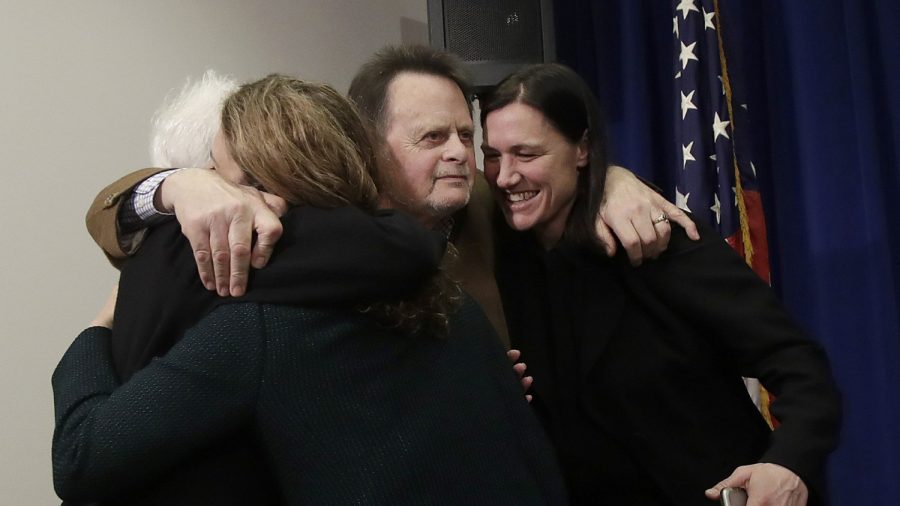SAN FRANCISCO—A U.S. jury on March 27 awarded more than $80 million in damages to a California man who blamed Roundup weed killer for his cancer, in a case that his attorneys say could help determine the fate of hundreds of similar lawsuits.
Edwin Hardeman proved that Roundup’s design was defective, it lacked sufficient cancer warnings and its manufacturer, agribusiness giant Monsanto, was negligent, the six-person jury in San Francisco found.
It awarded Hardeman more than $5 million in compensation and an additional $75 million in punitive damages. Hardeman, 70, put his arm around his wife, Mary, as the verdict was read and hugged his attorneys.

Monsanto says studies have established that glyphosate, the active ingredient in its widely used weed killer, is safe. The company said it will appeal.
“We are disappointed with the jury’s decision, but this verdict does not change the weight of over four decades of extensive science and the conclusions of regulators worldwide that support the safety of our glyphosate-based herbicides and that they are not carcinogenic,” according to a statement from Bayer, which acquired Monsanto last year.
Hardeman said he used Roundup products to treat poison oak, overgrowth and weeds on his San Francisco Bay Area property for years. The same jury previously found that Roundup was a substantial factor in Hardeman’s non-Hodgkin’s lymphoma.
“Today, the jury sent a message loud and clear that companies should no longer put products on the market for anyone to buy without being truthful, without testing their product and without warning if it causes cancer,” said Jennifer Moore, one of Hardeman’s attorneys.

Hardeman and his wife thanked their attorneys and jurors but declined additional comment.
A different jury in August awarded another man $289 million, but a judge later slashed it to $78 million. Monsanto has appealed.
Hardeman’s trial may be more significant than that case. U.S. Judge Vince Chhabria is overseeing hundreds of Roundup lawsuits and has deemed Hardeman’s case and two others “bellwether trials.”
The outcome of such cases can help attorneys decide whether to keep fighting similar lawsuits or settle them. Legal experts said verdicts in favor of Hardeman and the other test plaintiffs would give their attorneys a strong bargaining position in any settlement talks for the remaining cases before Chhabria.
Bayer says all government regulators that have looked at the issue have rejected a link between cancer and glyphosate.

Monsanto developed glyphosate in the 1970s, and the weed killer is now sold in more than 160 countries and widely used in the United States.
The herbicide came under increasing scrutiny after the France-based International Agency for Research on Cancer, which is part of the World Health Organization, classified it as a “probable human carcinogen” in 2015.
Lawsuits against Monsanto followed, and thousands are now pending nationwide.
Monsanto has attacked the international research agency’s opinion as an outlier. The U.S. Environmental Protection Agency says glyphosate is safe for people when used in accordance with label directions.
Bayer shares sag after U.S. jury verdict in Roundup cancer trial
Shares in Bayer hit an almost 7-year low on Thursday after a U.S. jury awarded $80 million to Hardeman.
German chemicals giant Bayer, which bought Roundup maker Monsanto last year for $63 billion, said it would appeal the verdict.
Its shares were down 1.3 percent at $62.45 at 1023 GMT, valuing the drugs and crop chemicals group at about $58 billion, well below the Monsanto price tag.
The stock was, however, spared the type of plunge it suffered last week when it fell 9.6 percent on the jury’s conclusion-part-way into the Hardeman trial—that there was a causal link between the weedkiller and the plaintiff’s disease.
Bayer’s market cap has dropped to about $58 billion since it lost the first big Roundup case. That’s more than it paid for Monsanto. https://t.co/ao5DEBzWXD via @PostDispatchbiz
— Roland Klose (@rwklose) March 28, 2019
Analysts at JP Morgan and Liberum said Bayer’s market value reflected overly pessimistic expectations of the German group eventually settling for up to $22 billion or $45 billion, respectively.
“Even if Monsanto/Bayer may win some cases, there is great uncertainty about the number of victories and defeats. That is why we expect Bayer to try to settle the remaining cases,” said Bryan Garnier analyst Jean-Jacques Le Fur.

Hardeman’s case was considered a bellwether trial to help determine the range of damages and define settlement options for the more than 760 other federal cases pending in the same court before U.S. District Judge Vince Chhabria. Other cases will be heard in state courts.
Reuters contributed to this report.

